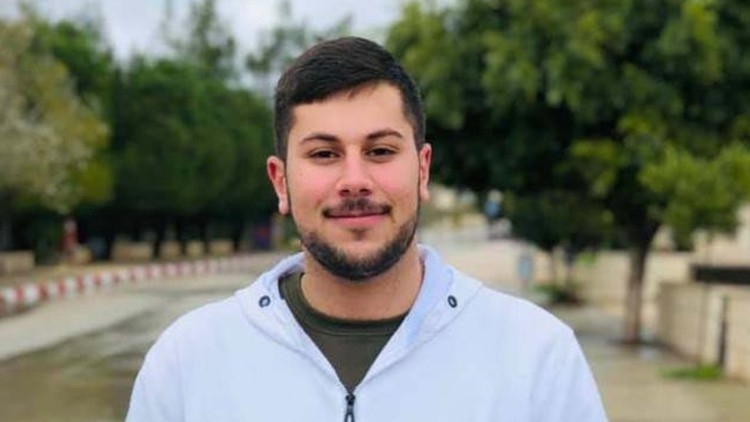Palestinian student leader violently detained by the PA after election success

Birzeit University students are demanding the immediate release of newly elected student leader Abdul Majeed Hassan, 23, who was violently arrested by the Palestinian Authority security services from his home in Ramallah on Sunday evening.
A short video clip published by the student's family showed several people in civilian clothing apprehending, dragging and beating Hassan, before forcing him into their vehicle.
After the news of the arrest spread, several student executives at Birzeit University issued statements denouncing his detention and describing it as undermining student activity and democratic work at the university.
It is not known why he was detained, though Hassan had just been elected as a student leader representing the Islamic bloc.
Shatha Hassan, Abdul Majeed's sister, told Middle East Eye that her brother was leaving his house in the Ein Musbah neighbourhood of central Ramallah when a group of young men intercepted him and started assaulting him.
Stay informed with MEE's newsletters
Sign up to get the latest alerts, insights and analysis, starting with Turkey Unpacked
"I was sitting in my room when I heard my brother's voice screaming, he was accompanied by my younger brother Saleh. I opened the window and saw four people surrounding him, beating him brutally. He tried to get rid of them, but they beat him more severely,” she said.
'The scene was very painful. They hit him mercilessly with a gun on his head in front of us'
- Shatha Hassan, Abdul Majeed Hassan's sister
Saleh tried to help his brother, but he was also beaten. Shatha said the assailants sprayed him with mace and he fell to the ground screaming.
According to Shatha, whose screams can be heard in the video from the window of her room, the assailants shouted that they were from the Palestinian Authority’s intelligence service.
When Hassan tried to resist them, two vehicles carrying masked people with batons arrived, and he was forced into a vehicle.
“The scene was very painful. They hit him mercilessly with a gun on his head in front of us,” Shatha said, adding that a detainee later released said Hassan had arrived at the detention centre in poor health and with wounds across his body.
Hassan’s family say they hold the Palestinian Authority fully responsible for their son's life, and believe he was arrested in relation to his student political activities and success in the Birzeit University Student Council elections in May.
Allegations of abuse
Ibrahim Bani Odeh, a representative of the Islamic bloc that won the recent student council elections, described Hassan’s arrest following the polls as a violation of all political norms.
He told MEE that Hassan was presented to the public prosecution in a deplorable condition.
“From the scene of the arrest, we thought that the kidnappers were Israeli undercover units, since they have arrested many university students in this brutal way. Beating, dragging, undressing and screaming were all Israeli means of arrest, but unfortunately, they were mimicked by the Palestinian security services against Abdul Majeed,” he said.
Bani Odeh said seven university students have been arrested since the end of the elections in May. Four are still in detention, and Bani Odeh said three were released after being physically and psychologically abused, including by being suspended from a wall.
The spokesperson for the Palestinian security services, Talal Dweikat, told MEE he didn't have any details to comment on the matter.
Shatha said her brother has recently been repeatedly threatened and beaten by the Palestinian security services, and targeted along with other students in the Islamic bloc.
“The Palestinian security services fabricate charges against Birzeit University students, including possession of weapons and receiving illegal money, but the actual investigation of them is based on their student activity and participation in the recent elections and the organisational structure of the Islamic bloc,” Bani Odeh said.
'We thought that the kidnappers were Israeli undercover units, since they have arrested many university students in this brutal way'
- Ibrahim Bani Odeh, student
He called on human rights organisations to intervene immediately to release Hassan and ensure the implementation of democracy, freedom of opinion and political affiliation among university students without any threats.
On Monday, the Lawyers for Justice NGO said Ramallah’s public prosecution office had extended Hassan’s detention with the general intelligence service for 48 hours.
The NGO noted that Hassan had been arrested against a background of high-profile student union work, though the prosecution’s investigation revolves around a different charge, a tactic often used to target students.
Hassan’s arrest sparked a wave of anger on students’ social media accounts, and on Tuesday all of Birzeit University closed in protest.
Meanwhile, the Progressive Student Union bloc at Birzeit University said it condemns the policy of political detention practised by the PA security services against student activists, which it warned would lead to confrontations with “unimaginable consequences”.
It also called for the urgent release of the detained students.
The Birzeit University administration, meanwhile, expressed its concern over Hasan's arrest and the continued campaign of arrests against its students.
“Birzeit University calls on the Palestinian Authority to release him immediately, stop the summons that illegally target university students, and release all students detained on political grounds,” it said.
Middle East Eye delivers independent and unrivalled coverage and analysis of the Middle East, North Africa and beyond. To learn more about republishing this content and the associated fees, please fill out this form. More about MEE can be found here.




